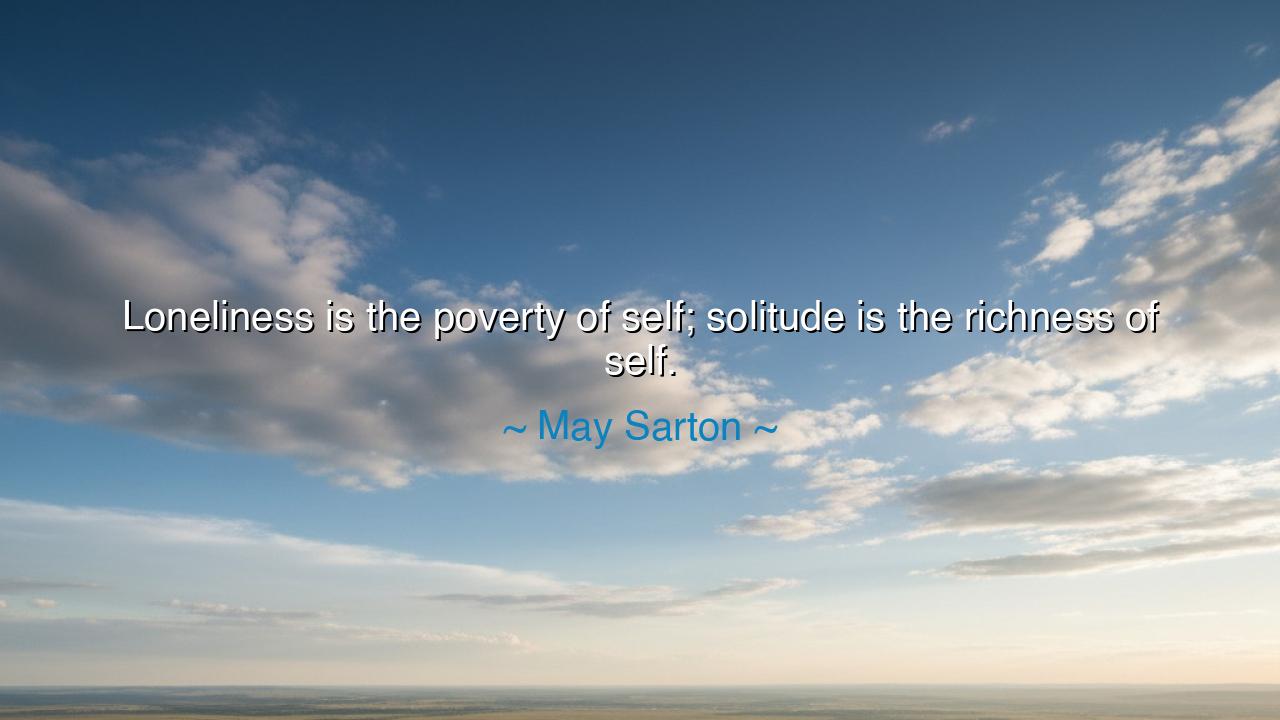
Loneliness is the poverty of self; solitude is the richness of






"Loneliness is the poverty of self; solitude is the richness of self." These words by May Sarton offer a profound meditation on the nature of self and the transformative power of solitude. In this poignant distinction, Sarton contrasts loneliness—the sense of emptiness and isolation we often feel in the absence of others—with solitude, the deep, fulfilling sense of being alone with oneself. To be lonely is to be empty, lacking a connection to one’s own essence, while solitude, when embraced consciously, is a space of growth, reflection, and inner abundance. Sarton’s words remind us that the richness of our true selves can only be accessed in moments of solitude, where we reconnect with our inner strength and wisdom.
In the ancient world, philosophers and sages understood the powerful relationship between solitude and the growth of the soul. Socrates, the wise philosopher of Athens, believed that true knowledge and wisdom could only come through self-reflection. Socrates often withdrew from the distractions of society to reflect on his thoughts and engage in deep dialogue with his own mind. For Socrates, solitude was not a sign of poverty or lack, but a way to connect with the deeper truths of existence. In the same way, Sarton’s distinction suggests that solitude is an opportunity to reconnect with our inner richness, while loneliness stems from a disconnection from this deeper self.
Consider the life of Marcus Aurelius, the Roman emperor and Stoic philosopher, who frequently wrote in solitude in his famous work, Meditations. Despite ruling the vast Roman Empire, Marcus Aurelius understood that true wisdom and inner peace could only be attained in moments of reflection and solitude. He often retreated from the noise of public life to meditate on his own thoughts and engage with his inner self. It was in these moments, alone with his reflections, that Marcus was able to gain clarity, find strength in the face of adversity, and lead with virtue. In this way, Marcus Aurelius embodies Sarton’s notion of solitude as the richness of self, where one finds strength in isolation, free from the influence of others.
Similarly, the Buddha spent much of his life in solitude after seeking enlightenment under the Bodhi tree. He understood that inner peace and the realization of the truth could not be found in the distractions of worldly life, but in the stillness of solitude. In his solitary moments, the Buddha gained the insight necessary to teach the path to enlightenment. The richness of self that he found in solitude was not about isolation, but about understanding the deeper nature of existence and the connection between all beings. For the Buddha, solitude was a necessary step toward awakening to the fullness of life.
The contrast between loneliness and solitude is not only an emotional or philosophical concept, but a practical one. Loneliness, in modern life, often arises from a lack of connection—not just to others, but to ourselves. We are bombarded by external stimuli, seeking validation, approval, and affirmation from others, which leaves us feeling empty when alone. This is the poverty of self—a disconnection from who we are at the core. In contrast, solitude, when embraced with intention, allows us to reconnect with our inner selves, finding strength and peace in being alone without the need for external validation. Sarton’s insight urges us to reframe our perception of being alone, from loneliness to an opportunity for personal growth and self-discovery.
The lesson from Sarton’s words is powerful and clear: solitude is not an enemy to be feared, but a companion that offers richness to our lives. In moments of solitude, we are given the space to reconnect with our deepest selves, to reflect, and to cultivate the wisdom and strength that lie within us. The more we learn to embrace solitude, the less we will experience loneliness, for we will find fulfillment in the depth of our own minds and hearts. As Socrates, Marcus Aurelius, and the Buddha understood, the path to wisdom, peace, and strength is often found in the moments when we are alone with ourselves.
In practical terms, we must learn to embrace solitude as a means of self-growth. This does not mean withdrawing from the world entirely, but carving out moments each day or week to be alone with our thoughts. Whether through meditation, journaling, or simply walking in nature, we can find solitude as a space for reflection and restoration. In these moments, we can learn to love the person we are alone with, discovering the richness of self that lies beneath the surface.
In conclusion, May Sarton’s words remind us that solitude is not a form of poverty, but a path to the richness of self. Just as Socrates, Marcus Aurelius, and the Buddha understood the necessity of solitude for personal growth, so too must we embrace solitude as a powerful tool for self-reflection and inner strength. The more we learn to be at peace with ourselves, the less we will experience the emptiness of loneliness. Let us, then, find the richness in our own company, knowing that in solitude, we have the space to discover our deepest truths and unlock the wisdom and peace that lie within.






AAdministratorAdministrator
Welcome, honored guests. Please leave a comment, we will respond soon